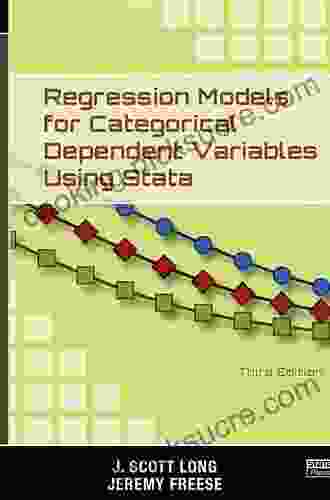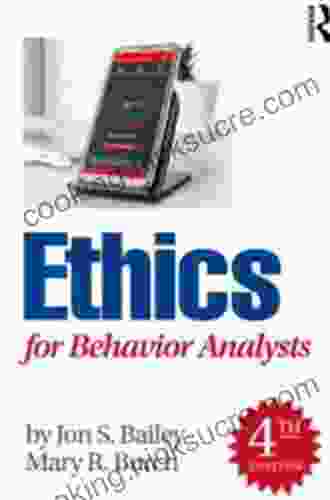Ethics For Behavior Analysts: A Comprehensive Guide by Kristin Briney

Ethics are essential for behavior analysts to ensure the well-being of their clients and maintain the integrity of the profession. This comprehensive guide by Kristin Briney explores the ethical guidelines, code of ethics, and ethical decision-making process for behavior analysts.
4.8 out of 5
| Language | : | English |
| File size | : | 3856 KB |
| Text-to-Speech | : | Enabled |
| Screen Reader | : | Supported |
| Enhanced typesetting | : | Enabled |
| Word Wise | : | Enabled |
| Print length | : | 406 pages |
Ethical Guidelines
The Behavior Analyst Certification Board (BACB) has developed a set of ethical guidelines for behavior analysts. These guidelines are based on the principles of beneficence, nonmaleficence, justice, and autonomy. Beneficence refers to the obligation to do good and prevent harm. Nonmaleficence refers to the obligation to avoid ng harm. Justice refers to the obligation to treat people fairly and equitably. Autonomy refers to the right of individuals to make their own decisions about their own lives.
The BACB ethical guidelines cover a wide range of topics, including:
- Informed consent
- Confidentiality
- Objectivity
- Conflict of interest
- Supervision
- Continuing education
Code of Ethics
The BACB has also developed a code of ethics for behavior analysts. The code of ethics is a more detailed set of rules that behavior analysts must follow. The code of ethics covers the same topics as the ethical guidelines, but it also includes additional provisions on topics such as:
- Ethical dilemmas
- Adjudication
- Ethics committee
Ethical Decision-Making
Behavior analysts must use an ethical decision-making process when making decisions about their clients. The ethical decision-making process involves:
- Identifying the ethical issues involved
- Considering the ethical guidelines and code of ethics
- Weighing the potential benefits and harms of each decision
- Making a decision that is in the best interests of the client
Ethical Dilemmas
Behavior analysts may face ethical dilemmas in their work. Ethical dilemmas are situations in which there is no clear right or wrong answer. When faced with an ethical dilemma, behavior analysts should:
- Seek consultation from colleagues or supervisors
- Review the ethical guidelines and code of ethics
- Consider the potential benefits and harms of each decision
- Make a decision that is in the best interests of the client
Adjudication
The BACB has an adjudication process for investigating and resolving complaints of ethical misconduct. The adjudication process is designed to protect the public and ensure the integrity of the profession.
If you have a complaint about the ethical conduct of a behavior analyst, you can file a complaint with the BACB. The BACB will investigate the complaint and determine if there is sufficient evidence to proceed with an adjudication. If there is sufficient evidence, the BACB will hold an adjudication hearing. The adjudication hearing will be presided over by a panel of three behavior analysts.
The panel will hear evidence from both the complainant and the respondent. The panel will then make a decision about whether or not the respondent has violated the ethical guidelines or code of ethics. If the panel finds that the respondent has violated the ethical guidelines or code of ethics, the panel may impose sanctions. Sanctions may include:
- Reprimand
- Suspension
- Revocation of certification
Ethics Committee
The BACB has an ethics committee that is responsible for interpreting the ethical guidelines and code of ethics. The ethics committee also provides guidance to behavior analysts on ethical issues.
If you have a question about the ethical guidelines or code of ethics, you can contact the BACB ethics committee. The ethics committee will review your question and provide you with guidance.
Ethical Jurisprudence
Ethical jurisprudence is the study of the ethical principles that underlie the ethical guidelines and code of ethics for behavior analysts. Ethical jurisprudence can be used to help behavior analysts understand the ethical issues involved in their work and make ethical decisions.
There are many different ethical theories that can be used to guide ethical decision-making. Some of the most common ethical theories include:
- Ethical principles
- Virtue ethics
- Utilitarianism
- Deontology
Ethical principles are general rules that can be used to guide behavior. For example, the ethical principle of beneficence states that behavior analysts should do good and prevent harm. The ethical principle of nonmaleficence states that behavior analysts should avoid ng harm.
Virtue ethics is based on the idea that ethical behavior is a matter of character. According to virtue ethics, behavior analysts should develop virtuous character traits, such as honesty, integrity, and compassion.
Utilitarianism is based on the idea that the ethical action is the action that produces the greatest good for the greatest number of people. According to utilitarianism, behavior analysts should consider the potential benefits and harms of each decision and make the decision that will produce the greatest good for the greatest number of people.
Deontology is based on the idea that ethical behavior is a matter of following rules. According to deontology, behavior analysts should follow the ethical guidelines and code of ethics, even if ng so may not produce the greatest good for the greatest number of people.
Ethical Reasoning
Behavior analysts should use ethical reasoning to make ethical decisions. Ethical reasoning is the process of using ethical principles, ethical theories, and ethical jurisprudence to make ethical decisions. Ethical reasoning can help behavior analysts understand the ethical issues involved in their work and make ethical decisions that are in the best interests of their clients.
Ethics are essential for behavior analysts to ensure the well-being of their clients and maintain the integrity of the profession. The BACB has developed a set of ethical guidelines and a code of ethics for behavior analysts. Behavior analysts should use an ethical decision-making process when making decisions about their clients. Behavior analysts may face ethical dilemmas in their work. If they do, they should seek consultation from colleagues or supervisors, review the ethical guidelines and code of ethics, consider the potential benefits and harms of each decision, and make a decision that is in the best interests of the client.
4.8 out of 5
| Language | : | English |
| File size | : | 3856 KB |
| Text-to-Speech | : | Enabled |
| Screen Reader | : | Supported |
| Enhanced typesetting | : | Enabled |
| Word Wise | : | Enabled |
| Print length | : | 406 pages |
Do you want to contribute by writing guest posts on this blog?
Please contact us and send us a resume of previous articles that you have written.
 Fiction
Fiction Non Fiction
Non Fiction Romance
Romance Mystery
Mystery Thriller
Thriller SciFi
SciFi Fantasy
Fantasy Horror
Horror Biography
Biography Selfhelp
Selfhelp Business
Business History
History Classics
Classics Poetry
Poetry Childrens
Childrens Young Adult
Young Adult Educational
Educational Cooking
Cooking Travel
Travel Lifestyle
Lifestyle Spirituality
Spirituality Health
Health Fitness
Fitness Technology
Technology Science
Science Arts
Arts Crafts
Crafts DIY
DIY Gardening
Gardening Petcare
Petcare Jamie Ivey
Jamie Ivey John Ramirez
John Ramirez Future Publishing
Future Publishing Pat Wray
Pat Wray Linda Anne Silvestri
Linda Anne Silvestri James Rebanks
James Rebanks Antonio Iturbe
Antonio Iturbe Rachael Chapman
Rachael Chapman Anna Holmwood
Anna Holmwood Andrew Beyer
Andrew Beyer Rachel Hawkins
Rachel Hawkins Mark M Meerschaert
Mark M Meerschaert Dorothy Pang
Dorothy Pang Roland Martin
Roland Martin James Branch Cabell
James Branch Cabell Joelle Charbonneau
Joelle Charbonneau Marvin L Bittinger
Marvin L Bittinger Nick Peters
Nick Peters Andrew Doughty
Andrew Doughty Daniel Humm
Daniel Humm Adam Mansbach
Adam Mansbach Steve Bisheff
Steve Bisheff Kerri Andrews
Kerri Andrews Pete Pfitzinger
Pete Pfitzinger Doug Swisher
Doug Swisher Richard Bolstad
Richard Bolstad Andrea Cataldo
Andrea Cataldo Tony Herman
Tony Herman Mara Rockliff
Mara Rockliff Jonathan Clements
Jonathan Clements James Geary
James Geary Tom Siegfried
Tom Siegfried Richard Maury
Richard Maury Ryan Pellett
Ryan Pellett Robin Hobb
Robin Hobb James Dodson
James Dodson James Willstrop
James Willstrop Shaun Assael
Shaun Assael Karen Tranberg Hansen
Karen Tranberg Hansen Sudhir Shirwadkar
Sudhir Shirwadkar Rashers Tierney
Rashers Tierney Thomas Watson
Thomas Watson Rich Luhr
Rich Luhr Nancy Mather
Nancy Mather J David Logan
J David Logan Kristin Briney
Kristin Briney Dana Mccullough
Dana Mccullough Jessica Mccrory Calarco
Jessica Mccrory Calarco Chris Salisbury
Chris Salisbury Kirby Arnold
Kirby Arnold Tom Lecompte
Tom Lecompte Jordan Romero
Jordan Romero Usa Pickleball Association
Usa Pickleball Association Elizabeth Marshall Thomas
Elizabeth Marshall Thomas Joseph Terry
Joseph Terry Gemma Rogers
Gemma Rogers Serena Valentino
Serena Valentino Patrick W Galbraith
Patrick W Galbraith Cliff Wilson
Cliff Wilson Leigh Bardugo
Leigh Bardugo Rick Heard
Rick Heard Jacqueline Edmondson
Jacqueline Edmondson Michael S Malone
Michael S Malone Mary Jane Sterling
Mary Jane Sterling Steven Poses
Steven Poses Charles Szypszak
Charles Szypszak Stuart L Kaplan M D
Stuart L Kaplan M D Jason Welker
Jason Welker Bobby Orr
Bobby Orr Peter May
Peter May Ricky Moore
Ricky Moore Jon Gillespie Brown
Jon Gillespie Brown Marcus Felson
Marcus Felson Geoffrey Wolff
Geoffrey Wolff Vin T Sparano
Vin T Sparano Morihei Ueshiba
Morihei Ueshiba Wendy Heard
Wendy Heard W J Hendry
W J Hendry Sean Pidgeon
Sean Pidgeon Nikola Tesla
Nikola Tesla Jason Louv
Jason Louv Luke Hohmann
Luke Hohmann Tamara Ireland Stone
Tamara Ireland Stone Brock Eide
Brock Eide Kelsie Stelting
Kelsie Stelting George Christian Pappas
George Christian Pappas Brenda Reed Pilcher
Brenda Reed Pilcher Simon Garfield
Simon Garfield James Mallory
James Mallory Patrick Hatt
Patrick Hatt Necoco
Necoco Mandy Baggot
Mandy Baggot Gaurav Suri
Gaurav Suri Anne Holler
Anne Holler Marcus A Pfeiffer
Marcus A Pfeiffer Christine Balaz
Christine Balaz Shane Ryan
Shane Ryan Bruce D Perry
Bruce D Perry John Morton
John Morton Rolf Potts
Rolf Potts Dylan Norton
Dylan Norton Robert Jay Lifton
Robert Jay Lifton Paco Underhill
Paco Underhill Janet Wolanin Alexander
Janet Wolanin Alexander J E Lendon
J E Lendon Dani Jacobs
Dani Jacobs Laird Hamilton
Laird Hamilton Terence Callery
Terence Callery Will Thornton
Will Thornton Andrew Blauner
Andrew Blauner Steve Caplin
Steve Caplin Loren Pope
Loren Pope Donald S Murray
Donald S Murray Barbara Merry
Barbara Merry Nick Marshall
Nick Marshall Kelly Tyler Lewis
Kelly Tyler Lewis William F Sensakovic
William F Sensakovic Kevin Cook
Kevin Cook Arianna Astuni
Arianna Astuni David W Brown
David W Brown Paul Rooyackers
Paul Rooyackers Lauren Daniels
Lauren Daniels Eric Engle
Eric Engle Gillian Tett
Gillian Tett Kjartan Poskitt
Kjartan Poskitt Anne Marie Meyer
Anne Marie Meyer Arlo Adams
Arlo Adams Ralph Zuranski
Ralph Zuranski Jay Greeson
Jay Greeson David Borgenicht
David Borgenicht Elizabeth Clor
Elizabeth Clor Mike Gauthier
Mike Gauthier Denise Riebe
Denise Riebe Mary Keith Piasecki
Mary Keith Piasecki Bettina Bonifatti
Bettina Bonifatti Andrew Duncan
Andrew Duncan Susan Williams White
Susan Williams White Andrea Flores
Andrea Flores Joe Cavallaro
Joe Cavallaro Luke Rosiak
Luke Rosiak John Bantin
John Bantin Robert B Yonaitis
Robert B Yonaitis 24th Edition Kindle Edition
24th Edition Kindle Edition Clayton Everline
Clayton Everline Metin Bektas
Metin Bektas Pietro Matracchi
Pietro Matracchi Sheila Jasanoff
Sheila Jasanoff Erica Hoke
Erica Hoke Dot Edu
Dot Edu Andrew Goliszek
Andrew Goliszek Sandy Stott
Sandy Stott Christina Kim
Christina Kim Robyn Sheldon
Robyn Sheldon Becky Lomax
Becky Lomax Nancy B Rapoport
Nancy B Rapoport Jeff Davis
Jeff Davis Gabrielle Coleman
Gabrielle Coleman April Vahle Hamel
April Vahle Hamel Laura Domino
Laura Domino Andrew Greiner
Andrew Greiner Ken Gullette
Ken Gullette Leisy J Abrego
Leisy J Abrego Peter Scazzero
Peter Scazzero Richard Bellman
Richard Bellman Jefferson Hawkins
Jefferson Hawkins Karen Robson
Karen Robson Bruce Mcnall
Bruce Mcnall Robin Ha
Robin Ha Rizwan Virk
Rizwan Virk Steven Johnson
Steven Johnson David Montgomery
David Montgomery Ben Orlin
Ben Orlin Sunny Anderson
Sunny Anderson Keith Sutton
Keith Sutton Jenna Miscavige Hill
Jenna Miscavige Hill Jim Shea
Jim Shea Jim Curran
Jim Curran Gregory Curtis
Gregory Curtis Andrea Wachter
Andrea Wachter Pliny The Elder
Pliny The Elder Andrea Olson
Andrea Olson Steven H Weintraub
Steven H Weintraub Lisa Bond
Lisa Bond Catie Czora
Catie Czora Ben Doughty
Ben Doughty Baz Thompson
Baz Thompson Julie Miller
Julie Miller Victoria Ortiz
Victoria Ortiz Melissa Reynolds
Melissa Reynolds Thomas S Kuhn
Thomas S Kuhn Laurie Seale
Laurie Seale Richard Heinberg
Richard Heinberg Jason Zemcik
Jason Zemcik C L Mississippi Morgan
C L Mississippi Morgan S Fatou
S Fatou Leslie Morgan Steiner
Leslie Morgan Steiner Ronald J Harshbarger
Ronald J Harshbarger Seth Reichelson
Seth Reichelson James E Wisher
James E Wisher Bill O Neill
Bill O Neill Catherine Montgomery
Catherine Montgomery Ola Ola
Ola Ola Jay Annelli
Jay Annelli John Gilbert
John Gilbert Trish Allison
Trish Allison Jenn Brandt
Jenn Brandt Stan Tekiela
Stan Tekiela Jack Hunnicutt
Jack Hunnicutt Julie Powers
Julie Powers Whitney Nelson
Whitney Nelson Carrie Ryan
Carrie Ryan Paul Abell
Paul Abell Brandon Mull
Brandon Mull Thomas Berger
Thomas Berger James Fox
James Fox Claire Maxted
Claire Maxted L Michele Issel
L Michele Issel Andy Bull
Andy Bull Paulette F C Steeves
Paulette F C Steeves Steven Arms
Steven Arms Matt Richtel
Matt Richtel Rashid Khalidi
Rashid Khalidi Robin Satty
Robin Satty Chris Mcmullen
Chris Mcmullen William Ritter
William Ritter Romney Steele
Romney Steele Wolfgang Hohlbein
Wolfgang Hohlbein D Harvey
D Harvey Christopher Sommer
Christopher Sommer Gary Thomas
Gary Thomas Ann Gadzikowski
Ann Gadzikowski Christos Lynteris
Christos Lynteris George E P Box
George E P Box Galen Wolf
Galen Wolf Stephanie Cacioppo
Stephanie Cacioppo Rachel Atwood
Rachel Atwood Chris Lilly
Chris Lilly Nancy Mcwilliams
Nancy Mcwilliams Michele Leathers
Michele Leathers Marta Szabo
Marta Szabo Jack Purdum
Jack Purdum Annette Curtis Klause
Annette Curtis Klause Aldous Huxley
Aldous Huxley Robert Sky Allen Ph D
Robert Sky Allen Ph D Rick Westhead
Rick Westhead Ian O Connor
Ian O Connor Jonathan Cummings
Jonathan Cummings Richard P Feynman
Richard P Feynman Sarah Outen
Sarah Outen Arous Brocken
Arous Brocken Guillermo Ferrara
Guillermo Ferrara Robert Hamill
Robert Hamill Course Hero
Course Hero Lundy Bancroft
Lundy Bancroft Nathaniel Philbrick
Nathaniel Philbrick C L Werner
C L Werner Luigi Gabriele Conti
Luigi Gabriele Conti Rupert Sheldrake
Rupert Sheldrake Joe Wells
Joe Wells Anne Bogel
Anne Bogel Minal Hajratwala
Minal Hajratwala Sid Thatte
Sid Thatte Andrew Brown
Andrew Brown Sue Fierston
Sue Fierston Hasok Chang
Hasok Chang V E Schwab
V E Schwab Tracy Townsend
Tracy Townsend Namina Forna
Namina Forna Benedict Carey
Benedict Carey Ronald W Doerfler
Ronald W Doerfler M D Johnson
M D Johnson Galit Shmueli
Galit Shmueli Stephen Chbosky
Stephen Chbosky Emily Henry
Emily Henry Robert H Miller
Robert H Miller David Abram
David Abram Stephen Wiggins
Stephen Wiggins Tom Lodziak
Tom Lodziak Nic Oatridge
Nic Oatridge Lynne L Finch
Lynne L Finch Bob Mayer
Bob Mayer Leslie Sokol
Leslie Sokol Lars Muhl
Lars Muhl Mike Cyra
Mike Cyra Richard Munson
Richard Munson George Mahood
George Mahood Suzy Ashworth
Suzy Ashworth Stephan J Guyenet
Stephan J Guyenet Stacey Little
Stacey Little Sandra Glosser
Sandra Glosser Linda Eyre
Linda Eyre Roberto Pedreira
Roberto Pedreira Dayton O Hyde
Dayton O Hyde Andrew Feinberg
Andrew Feinberg Hayley Campbell
Hayley Campbell Tod Schimelpfenig
Tod Schimelpfenig Charles H Hapgood
Charles H Hapgood James R Morrow Jr
James R Morrow Jr Elizabeth S Trafalgar
Elizabeth S Trafalgar Michael Judge
Michael Judge Richard N Aufmann
Richard N Aufmann Big Daddy Ozone
Big Daddy Ozone Joseph Luzzi
Joseph Luzzi Noel Janis Norton
Noel Janis Norton Frans De Waal
Frans De Waal Kristine Papin Morris
Kristine Papin Morris Steven J Matthiesen
Steven J Matthiesen Carmen Micsa
Carmen Micsa Greg Presto
Greg Presto James A Middleton
James A Middleton Margaret Thorsborne
Margaret Thorsborne Christian Keur
Christian Keur Ruby Walker
Ruby Walker Sorin Dumitrascu
Sorin Dumitrascu Jeremy Freese
Jeremy Freese E K Johnston
E K Johnston Wildlife Trusts
Wildlife Trusts Peter Mcbride
Peter Mcbride Melissa Caughey
Melissa Caughey Christine Heppermann
Christine Heppermann Rob Taylor
Rob Taylor Kenneth S Shultz
Kenneth S Shultz Milo Stewart
Milo Stewart Ivan Pastine
Ivan Pastine Hugh Raffles
Hugh Raffles Robert Bacal
Robert Bacal Ken Blanchard
Ken Blanchard Charlotte Elkins
Charlotte Elkins Daniel Shiffman
Daniel Shiffman Chiara Marletto
Chiara Marletto Joe Posnanski
Joe Posnanski Rajani Katta
Rajani Katta Patrick Mouratoglou
Patrick Mouratoglou Deaver Brown
Deaver Brown Daniel P Murphy
Daniel P Murphy Susanna Kearsley
Susanna Kearsley Jakub Marian
Jakub Marian Andrea Gonzales
Andrea Gonzales Kathleen Dean Moore
Kathleen Dean Moore Raymond Coppinger
Raymond Coppinger Brad Schoenfeld
Brad Schoenfeld Andrea Komlosy
Andrea Komlosy Gabby Rivera
Gabby Rivera Neil Oliver
Neil Oliver Dr Gabriel Peter Salgo
Dr Gabriel Peter Salgo Josh Tabor
Josh Tabor Giada De Laurentiis
Giada De Laurentiis Robin Mamlet
Robin Mamlet C B Lee
C B Lee Terry Ann Williams Richard
Terry Ann Williams Richard Jennifer Blair
Jennifer Blair Paul Stamets
Paul Stamets Andrea Hudy
Andrea Hudy James Turnbull
James Turnbull Kylie Lee Baker
Kylie Lee Baker Meiso
Meiso Rob Summers
Rob Summers Tim Wharnsby
Tim Wharnsby Frances Evesham
Frances Evesham William Gerin
William Gerin Mark Mcconville
Mark Mcconville Michio Kaku
Michio Kaku Bernard Moitessier
Bernard Moitessier Jen Calonita
Jen Calonita Department Of Defense
Department Of Defense Andrea Bemis
Andrea Bemis Gerald A Moore Sr
Gerald A Moore Sr Lucia Ashta
Lucia Ashta Joseph Ledoux
Joseph Ledoux A J Carlisle
A J Carlisle Ronald D Davis
Ronald D Davis Donna Bollinger
Donna Bollinger Jennifer Anne Davis
Jennifer Anne Davis Andre Watson
Andre Watson Kyle Keegan
Kyle Keegan Malinda Lo
Malinda Lo Brian Azzarello
Brian Azzarello Jim Apfelbaum
Jim Apfelbaum Victoria Schwab
Victoria Schwab Joseph Bruchac
Joseph Bruchac Joey Miller Msw Lcsw
Joey Miller Msw Lcsw Andrea Curtis
Andrea Curtis Tim Ryan
Tim Ryan Kelly Oliver
Kelly Oliver Victoria Allman
Victoria Allman James Lyons Weiler
James Lyons Weiler Samantha Rodman
Samantha Rodman Vertamae Smart Grosvenor
Vertamae Smart Grosvenor Sarah Castille
Sarah Castille Jimmy Elliott
Jimmy Elliott Bisco Hatori
Bisco Hatori Brian C Muraresku
Brian C Muraresku Candace Clark Trinchieri
Candace Clark Trinchieri Leslie Vedder
Leslie Vedder Kindra Gordon
Kindra Gordon Andrew St Pierre White
Andrew St Pierre White Cathal Armstrong
Cathal Armstrong Lena Shev
Lena Shev Andrew Gelman
Andrew Gelman Mara Vorhees
Mara Vorhees Rita Jablonski
Rita Jablonski Lori Shandle Fox
Lori Shandle Fox Eugene Raikhel
Eugene Raikhel Bernard A Chavis
Bernard A Chavis Kathryne Kennedy
Kathryne Kennedy Greg Ruth
Greg Ruth Martin Rooney
Martin Rooney Mira Kirshenbaum
Mira Kirshenbaum Andrej Spec
Andrej Spec Jenny Mackay
Jenny Mackay Craig Custance
Craig Custance Francesca Zappia
Francesca Zappia David Alloway
David Alloway Steve Sheinkin
Steve Sheinkin Steven M Fiser
Steven M Fiser Laura Lincoln Maitland
Laura Lincoln Maitland Kailin Gow
Kailin Gow Lonely Planet
Lonely Planet Maria Konnikova
Maria Konnikova Katharine B Soper
Katharine B Soper Jaak Panksepp
Jaak Panksepp David Scott
David Scott Peter Boardman
Peter Boardman Steve Scott
Steve Scott Oliver Perkins
Oliver Perkins Bhavesh Mamtani
Bhavesh Mamtani Marissa Meyer
Marissa Meyer Raymond E Feist
Raymond E Feist Sara Manning Peskin
Sara Manning Peskin Riley Black
Riley Black Ian Tattersall
Ian Tattersall Erich Neumann
Erich Neumann Bernard Craw
Bernard Craw 18th Edition Kindle Edition
18th Edition Kindle Edition Mike Davenport
Mike Davenport Sameera Khan Rd Pa C
Sameera Khan Rd Pa C George Hospodar
George Hospodar Caren Van Slyke
Caren Van Slyke Mark Hume
Mark Hume Andrea Cremer
Andrea Cremer Harriet Brown
Harriet Brown Michael T Nygard
Michael T Nygard Matt Fulks
Matt Fulks Buster Benson
Buster Benson Zak Mt Standridge
Zak Mt Standridge Michael Hermann
Michael Hermann Bruce Bowlen
Bruce Bowlen Jed Z Buchwald
Jed Z Buchwald Steve Anthony Tallon
Steve Anthony Tallon H Spencer Lewis
H Spencer Lewis Rachel Meltzer Warren
Rachel Meltzer Warren Michael Anderle
Michael Anderle Kristen Thone
Kristen Thone Lilith Starr
Lilith Starr Bridget Portmann
Bridget Portmann Tillie Walden
Tillie Walden Thomas Meyer
Thomas Meyer Isabel Sterling
Isabel Sterling Florent Buisson
Florent Buisson Ewen Levick
Ewen Levick Roger Atwood
Roger Atwood Bonita Norris
Bonita Norris Laurie Ann Thompson
Laurie Ann Thompson Mason Deaver
Mason Deaver Garcilaso De La Vega
Garcilaso De La Vega Marta Obiols Llistar
Marta Obiols Llistar Patsy M Lightbown
Patsy M Lightbown Ed Willes
Ed Willes Paul Kalas
Paul Kalas Gwendolyn Griffith Lieuallen
Gwendolyn Griffith Lieuallen Walter Greiner
Walter Greiner Elizabeth S Meckes
Elizabeth S Meckes Prasad Raju V V N R Pathapati
Prasad Raju V V N R Pathapati Jennifer L Armentrout
Jennifer L Armentrout Connie J Wells
Connie J Wells Kiersten White
Kiersten White Timothy Johnson
Timothy Johnson Peter David
Peter David Hampton Sides
Hampton Sides
Light bulbAdvertise smarter! Our strategic ad space ensures maximum exposure. Reserve your spot today!

 Jeffery BellA Comprehensive Guide to Becoming a Psychoanalytic Psychotherapist: Exploring...
Jeffery BellA Comprehensive Guide to Becoming a Psychoanalytic Psychotherapist: Exploring...
 Henry HayesThe New Utmost Fertility Diet Cookbook: The Ultimate Guide to Preparing for...
Henry HayesThe New Utmost Fertility Diet Cookbook: The Ultimate Guide to Preparing for...
 Dwayne MitchellRegression Models for Categorical Dependent Variables Using Stata Third...
Dwayne MitchellRegression Models for Categorical Dependent Variables Using Stata Third... Cody BlairFollow ·2.9k
Cody BlairFollow ·2.9k Jan MitchellFollow ·8.5k
Jan MitchellFollow ·8.5k George Bernard ShawFollow ·8.6k
George Bernard ShawFollow ·8.6k John GrishamFollow ·12.2k
John GrishamFollow ·12.2k Jarrett BlairFollow ·18.1k
Jarrett BlairFollow ·18.1k Roger TurnerFollow ·14.4k
Roger TurnerFollow ·14.4k Lord ByronFollow ·6.8k
Lord ByronFollow ·6.8k John Dos PassosFollow ·5.3k
John Dos PassosFollow ·5.3k

 Demetrius Carter
Demetrius CarterGolf Scrimmages: Realistic Practice Games Under Pressure
Golf scrimmages are...

 Andres Carter
Andres CarterAhsoka Tano: The Force-Wielding Togruta Who Shaped the...
Ahsoka Tano is one of the most...

 Greg Foster
Greg FosterUndeath Ascendant: A Blood-Soaked Literary Odyssey into...
Immerse yourself in a macabre tapestry of...

 Paulo Coelho
Paulo CoelhoHow an English Polymath and French Polyglot Discovered...
The Rosetta Stone is...
4.8 out of 5
| Language | : | English |
| File size | : | 3856 KB |
| Text-to-Speech | : | Enabled |
| Screen Reader | : | Supported |
| Enhanced typesetting | : | Enabled |
| Word Wise | : | Enabled |
| Print length | : | 406 pages |










